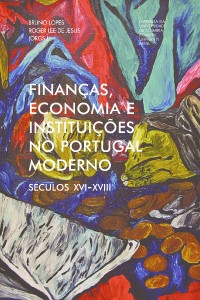Please use this identifier to cite or link to this item:
https://hdl.handle.net/10316.2/47064| DC Field | Value | Language |
|---|---|---|
| dc.contributor.author | Lopes, Bruno | |
| dc.date.accessioned | 2019-07-22T15:58:30Z | |
| dc.date.accessioned | 2020-09-04T14:41:42Z | - |
| dc.date.available | 2019-07-22T15:58:30Z | |
| dc.date.available | 2020-09-04T14:41:42Z | - |
| dc.date.issued | 2019 | - |
| dc.identifier.isbn | 978-989-26-1638-4 (PDF) | |
| dc.identifier.isbn | 978-989-26-1637-7 | |
| dc.identifier.uri | https://hdl.handle.net/10316.2/47064 | - |
| dc.description.abstract | Even today, the connection between inquisitorial activity and confiscation of assets persists in the collective memory. The study of inquisitorial finances entails the definition of the institution’s financing bases, which certainly went beyond the confiscation of assets, mostly, over the new Christian population – but not exclusively. The present work intends to draw a global analysis of the sources of income of the different metropolitan courts of the Portuguese Inquisition (Coimbra, Évora and Lisbon). The focus of analysis is on the different means of financing developed by the Holy Office as a whole. In addition, it is intended to identify the institutional relations between the Inquisition and the other powers of the Modern Era, especially between the chronological landmarks of 1640 and 1773. It is therefore intended to question the composition of the range of funding available to the Inquisition and who contributed to its constitution. In some cases, the reasons why they were those recipes and not others seem clearer; in others, the answers are still somewhat diffuse. Apparently, the finances of the Portuguese Inquisition were always dependent on the royal estate, and the institution has not been able to independently develop its own means of financing. This is the argument to be developed. | eng |
| dc.description.abstract | Ainda hoje, persiste na memória coletiva a associação entre a atividade inquisitorial e o confisco de bens. O estudo das finanças inquisitoriais acarreta a definição das bases de financiamento da instituição, que iam, certamente, além das receitas decorrentes da apreensão da propriedade privada, principalmente sobre a população cristã-nova mas não em exclusivo. O trabalho que se apresenta pretende traçar uma análise global das fontes de receita dos vários tribunais metropolitanos da Inquisição portuguesa (Coimbra, Évora e Lisboa). O foco de análise estará centrado nos diferentes meios de financiamento, desenvolvidos pelo Tribunal no seu conjunto. Para além disso, pretende-se identificar as relações institucionais entre a Inquisição e os demais poderes da Época Moderna, sobretudo, entre os marcos cronológicos de 1640 e 1773. Assim, procurar-se-á questionar como era composto o leque de meios de financiamento à disposição do Santo Ofício e quem contribuiu para a sua constituição. Nalguns casos, as razões porque eram aquelas receitas e não outras parecem mais evidentes; noutros, as respostas são ainda um pouco difusas. Aparentemente, as finanças da Inquisição portuguesa estiverem muito dependentes da fazenda régia e a instituição não soube desenvolver, autonomamente, meios de financiamento próprios. É este o argumento que se pretende desenvolver. | por |
| dc.language.iso | por | - |
| dc.publisher | Imprensa da Universidade de Coimbra | por |
| dc.relation.ispartof | http://hdl.handle.net/10316.2/47058 | por |
| dc.rights | open access | - |
| dc.subject | Inquisition | eng |
| dc.subject | income | eng |
| dc.subject | confiscations | eng |
| dc.subject | royal finances | eng |
| dc.subject | Inquisição | por |
| dc.subject | receitas | por |
| dc.subject | confisco de bens | por |
| dc.subject | finanças régias | por |
| dc.title | Para além do Fisco: receitas dos tribunais do Santo Ofício português: (1640-1773) | por |
| dc.title.alternative | Beyond confiscations: revenues for Portuguese Inquisition tribunal's: (1640-1773) | eng |
| dc.type | bookPart | por |
| uc.publication.firstPage | 171 | - |
| uc.publication.lastPage | 200 | - |
| uc.publication.location | Coimbra | por |
| dc.identifier.doi | 10.14195/978-989-26-1638-4_6 | - |
| uc.publication.digCollection | PB | por |
| uc.publication.orderno | 6 | - |
| uc.publication.area | Artes e Humanidades | por |
| uc.publication.bookTitle | Finanças, economias e instituições no Portugal moderno: séculos XVI-XVIII | - |
| uc.publication.manifest | https://dl.uc.pt/json/iiif/10316.2/47064/199798/manifest?manifest=/json/iiif/10316.2/47064/199798/manifest | - |
| uc.publication.thumbnail | https://dl.uc.pt/retrieve/10993442 | - |
| uc.publication.parentItemId | 55108 | - |
| uc.itemId | 67963 | - |
| item.fulltext | With Fulltext | - |
| item.grantfulltext | open | - |
| Appears in Collections: | Finanças, economias e instituições no Portugal moderno: séculos XVI-XVIII | |
Files in This Item:
| File | Description | Size | Format | |
|---|---|---|---|---|
| para_alem_do_fisco__receitas_dos_tribunais.pdf | 2.88 MB | Adobe PDF |  |
Items in DSpace are protected by copyright, with all rights reserved, unless otherwise indicated.
